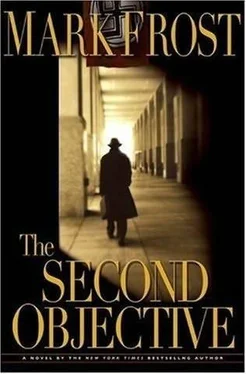“May I ask the purpose of our new brigade, sir?”
“Yes,” said Stielau.
Bernie hesitated. “What is the purpose of our new brigade, sir?”
“I said you could ask. I didn’t say I would tell you. You’re dismissed, Private Oster.”
Grafenwöhr
NOVEMBER 1944
Bernie tried to bury his fear by losing himself in the camp’s routine. Over two thousand men from every corner of the Reich arrived during the following week. Bernie helped conduct their initial interviews, asking questions to determine their level of competence in English, both speaking and comprehension. They were then classified into four categories. One: fluency in English and working knowledge of American slang. Two: fluency without knowledge of specific American idioms. Three: general comprehension and the ability to conduct limited conversations. Four: restricted comprehension, men who had studied English in school without real-world application.
Bernie quickly realized that most of the “volunteers” had vastly overstated their abilities. By the end of the week, as the last men arrived, he had picked fewer than twenty to join him in Category One. Fifty went into Category Two. The third category had about one hundred men in it, and the fourth another two hundred. As for the rest, over two-thirds of the men who had been summoned to Grafenwöhr , their English was limited to single-word responses. Bernie barracked with the rest of the Ones and Twos; Threes and Fours occupied separate quarters across the yard, and the rest stayed on the far side of the compound.
The men were issued neutral olive-green uniforms without insignia. All previous ranks were erased, and officers received no preferential treatment. They dined together in the same large mess hall, eating meals that far surpassed normal army fare. Contact with friends or family was forbidden. Every man signed an oath of silence, and letters home had to pass a censor’s strict review. Medicine and prescription drugs were dispensed freely to prevent illness, since no one was allowed out of camp to see a doctor. This taut atmosphere fueled rumors and speculation about their brigade’s reason for being, which flew through the camp, mutating on a daily basis. Their true purpose remained a mystery.
They heard their first explanation when Bernie and the rest of the brigade were called one day at dawn to a general assembly in the compound. Captain Stielau addressed them. They were now part of the 150th Panzer Brigade, he said, operating under the command of Colonel Otto Skorzeny. The mention of his name sent a ripple through the yard; he was without rival the most notorious figure in the German armed forces. Stielau told them their mission was called “Operation Greif ,” and they were being trained to defend Cologne when the Allies attacked across the Rhine. It sounded plausible, but Bernie found it impossible to reconcile with what they were being taught.
Their training began each morning with English lessons, focusing on American slang, and tutoring to eliminate native accents. Bernie helped craft a crash course on American culture, using newspapers, magazines, sports sections, and comic strips. Tests were given each day to drill this information into long-term memory. The men were ordered to use only English; anyone heard speaking German was disciplined with solitary confinement.
Each afternoon they were put through Skorzeny’s commando training: demolition, communications, reconnaissance, special weapons, light artillery, night fighting in both urban and forest environments, hand-to-hand combat. They were schooled in map reading, the basics of movement under combat conditions, camouflage techniques, and communications. They were taught how to drive and service captured American jeeps, scout cars, half-tracks, and tanks. Each man in Categories One and Two was issued an M1 rifle. Ammunition was too scarce for target practice, but they learned to carry, field strip, and maintain their rifles as rigorously as any GI.
After dinner they gathered in the mess hall to listen to U.S. Armed Forces Radio. Beer was served and they were encouraged to sing along with the popular songs of American recording artists. On some nights they watched American films, in English, with orders to observe and mimic the actors’ mannerisms. Seeing these familiar faces again, the first Hollywood stars he’d seen in years, made Bernie desperately homesick. His dread about what Skorzeny was really preparing them for grew with each passing day; only exhaustion kept it from overwhelming his mind.
At the end of the second week, the fluent English speakers, about eighty men, were placed directly under the command of Captain Stielau. Except for meals, they now spent their days apart from the others, and their language training intensified. Whenever shipments of new Allied material arrived-uniforms, boots, weapons-Stielau’s men received it first. Bernie believed that the future objectives of the two groups, whatever they might be, had begun to diverge.
Bernie met one other American-born man in Category One, a U.S. Army deserter named William Sharper. He had served in the American Army until after the invasion of Normandy. Sharper took a lead role during training, teaching the men specific GI behaviors; the way they slouched, chewed gum, how to rip open a pack of cigarettes with a thumbnail, and the fine art of swearing. Bernie stayed clear of him, disturbed by the violence he saw in the man’s eyes. A handful of others were former members of the German diplomatic corps who had learned English serving in foreign embassies. The rest came from the merchant marine, itinerant seamen who at some point had worked on American or English ships. One was a former porter on the Queen Mary . Their isolation, intense physical training, and the airtight atmosphere of secrecy brought them quickly and closely together as a unit.
At the start of the third week, each man in Bernie’s unit was assigned an American name. American dog tags were issued bearing these names, along with a new rank, and they were ordered to refer to one another only by these new names and ranks. They were told to create and memorize a fictional American history: place of birth, family members, education, hometown history, favorite pets, girlfriends left behind, baseball teams, local geography. Bernie decided the only way to create a life story he could remember under pressure was to keep it as close as possible to his own. A New Yorker from Brooklyn, the son of immigrant parents, he became Private James Tenella.
That Tuesday Bernie was summoned to the interview cabin. A new arrival sat joking with Stielau’s lieutenant, waiting to go through the evaluation process. Unlike the hundreds who’d preceded him, he still wore his German uniform: the crisp black tunic of a Waffen -SS lieutenant. He was in his mid to late twenties, wiry, compact, with close-cropped blond hair and a ready, dazzling smile.
Stielau’s lieutenant waved Bernie into the room: “Private Tenella, meet our latest arrival, SS Unterstürmführer Erich Von Leinsdorf.”
Von Leinsdorf stood up to shake his hand, and looked him in the eye. “A pleasure. They tell me you may be able to iron the starch out of my plummy Mid-Atlantic tones.”
Von Leinsdorf spoke perfect English, with a crisp upper-class British accent.
“Whatever it takes, sir,” said Bernie.
Stielau’s lieutenant handed Bernie the clipboard and left the room. Von Leinsdorf perched on the edge of the table and opened a sterling silver cigarette case engraved with his initials.
“I suppose I’ll have to start smoking Lucky Strikes,” he said. “No more English Players for me.”
Von Leinsdorf torched his cigarette with a matching silver lighter and smiled again. He smoked like a movie star, or someone who had studied movie stars smoking. Despite his easygoing charm, Bernie felt a visceral wariness of the man. He seemed to take up more space than he physically occupied. The superior airs seemed characteristic for someone from his class, but Bernie was reacting to something starker than the aristocratic “Von” in his name. He pulled back the chair Von Leinsdorf had been using and sat down facing him.
Читать дальше












